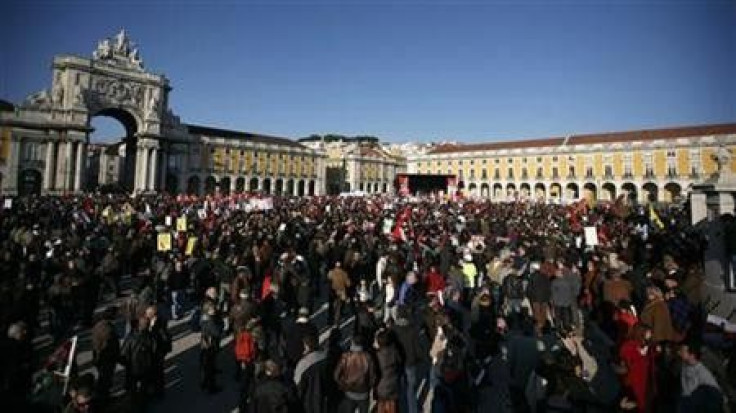Austerity: It's as Unpopular in Portugal as in Greece [PHOTOS]

(Reuters) - More than 100,000 people packed Lisbon's vast Palace Square on Saturday in the largest rally against austerity and economic hardships since Portugal resorted to a European Union/International Monetary Fund bailout last May -- and organizers vowed to step up protests and labor action.
The mass rally occurred just four days before Portugal's international lenders were due to start the quarterly evaluation of the bailout implementation on Wednesday in the finance ministry building, which overlooks the square by the river Tagus. They come amid concerns Portugal may need more bailout funds, if not a debt restructuring like Greece.
We take this opportunity here to make our own evaluation on behalf of those who suffer daily, Armenio Carlos, head of the country's largest union, CGTP, told supporters as the crowd chanted: IMF doesn't call the shots here! We have to step up the struggle, he said. Carlos promised the next wave of rallies across Portugal as soon as Feb. 29.
The country needs to remove the rope from around its neck, Carlos said, contending Portugal should try to renegotiate its debt rather than impose more austerity, an argument he has made consistently.
The peaceful rally under the banners of the 750,000-strong CGTP, which last month refused to sign a pact with the government on labor-market reform, showed that social strife is running strong and likely to grow even though other unions agreed to the reforms demanded by the bailout terms.
Spending cuts and tax hikes needed to meet the fiscal terms of the bailout have caused the worst recession in Portugal since the few turbulent years that followed the 1974 return to democracy. Unemployment is at a record of about 13 percent.
The bailout is good for the creditors who get billions in interest and commissions, good for the banks ... But the measures are really bad for the workers, youths, pensioners, for 2.7 million Portuguese on the verge of poverty and those already below the poverty line, Carlos said.
CGTP said the rally was the largest in the past 30 years and brought together some 300,000 people, but it is not unusual for the unions to exaggerate the numbers. Police would not provide estimates. Many of the protesters came from other cities in dozens of buses organized by CGTP.
One of the placards carried by demonstrators read: Against exploitation and impoverishment! Another policy is possible and necessary!
They are stealing the salaries and the rights we had. They are stealing from the poor to give to the rich. I'm poor, and I have to protest. The more we stay quiet, the more they rob, said Jorge, one of the protesters in his 20s.
Portugal's debt crisis has so far failed to provoke the scale of labor protests seen in Greece. There have been two general strikes in the past two years, and workers in transport and other sectors have staged regular stoppages.
Compared with some other European countries, protest rallies have been few and peaceful, although large in numbers.
But analysts say there could be more unrest as some of the government's most stringent austerity measures come into effect this year. Tax hikes and cuts, including the elimination of two months of civil servants' wages, have already sent the country into its deepest recession since the 1970s.
Still, the head of the second-largest union, which signed the labor-reform pact, said at the time it would significantly decrease the likelihood of social strife spiraling out of control in Portugal.
© Copyright Thomson Reuters 2024. All rights reserved.











